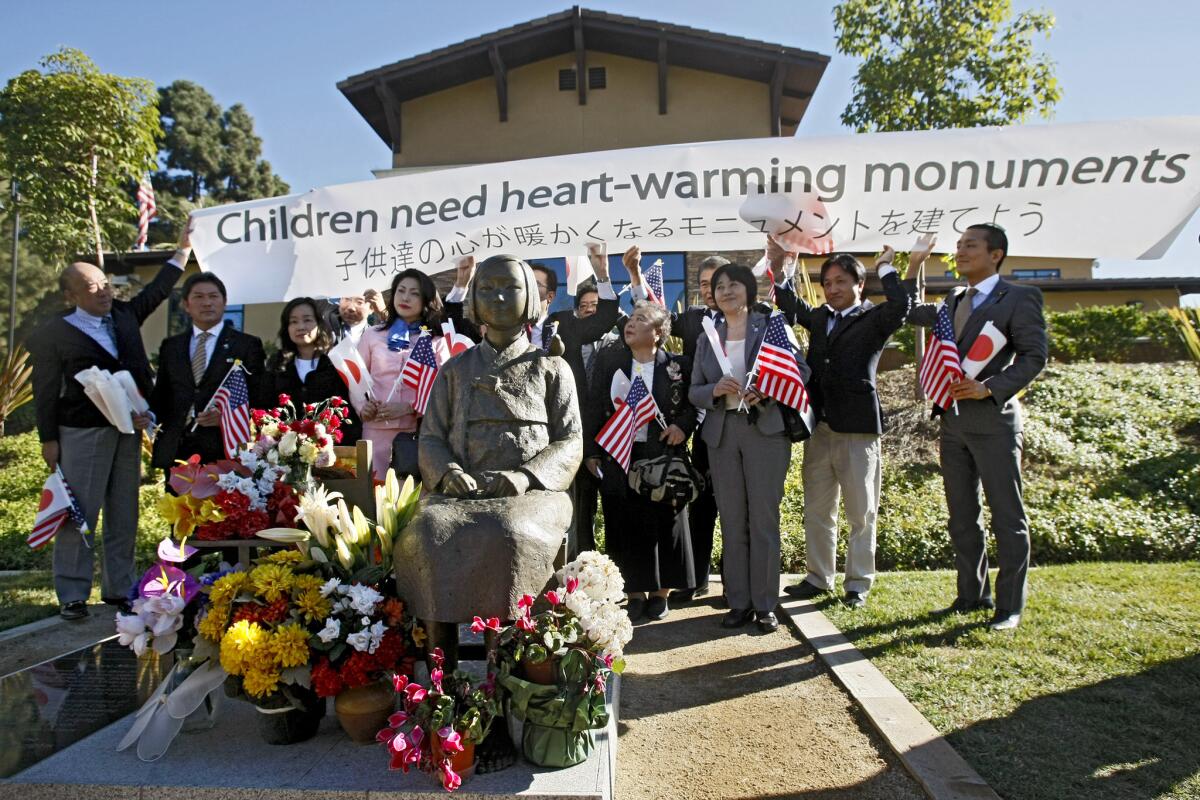Third Japanese delegation bashes comfort-women statue

About a dozen Japanese politicians visited Glendale Thursday calling for the city to remove a monument that honors women taken from Korea, China, the Philippines and other countries to serve as sex slaves by the Japanese Imperial Army during World War II.
PHOTOS: Third Japanese delegation bashes comfort-women statue
The visit marked the third delegation of Japanese politicians who traveled to Glendale since the 1,100-pound statue was erected in Central Park in July.
The four-day trip included visits to the monument — which features a girl in Korean garb sitting next to an empty chair — the Japanese Garden and Tea House in Glendale, Glendale City Hall, Buena Park City Hall and a press conference at the Japanese American Cultural and Community Center in Little Tokyo.
For decades, a contingent of Japanese, including some popular political figures, has denied the extent of — and sometimes repudiated altogether — their country’s involvement in coercing an estimated 80,000 to 200,000 so-called comfort women to work in brothels serving the Japanese military.
However, the Japanese government has acknowledged that women were indeed coerced by the military and deprived of their freedoms, and numerous victims have come forward to publicly share harrowing tales of their servitude.
While the comfort-women issue has long been a controversial one in the two Asian countries, the Glendale statue escalated a feud between those who want to increase awareness of comfort women and their opponents, members of the delegation said.
“Are we angry? Yes,” said Setsuko Sakuraba, a city assemblywoman from Joetsu City, which has a population of more than 200,000, during the press conference on Thursday. “
But I am more sad than angry because this statue is not supporting world peace.”
Earlier that day, Yoshiko Matsuura, a city assemblywoman from the Suginami Ward in Tokyo, which has a population of 543,000, said the delegation is concerned about the statue’s effect on Japan’s reputation.
“We would like to protect the honor of the Japanese people,” she said, adding that the mature topics etched on the monument’s plaque are not appropriate for a public park where children visit.
The delegation held a large sign in front of the statue that read: “Children need heart-warming monuments” as they posed for pictures by the statue before a crowd of Japanese and Korean media.
Korean groups lobbying for the installation of comfort-women monuments in American cities hope memorials like the one in Glendale — the first on public land on the West Coast — will pressure the Japanese parliament, known as the Diet, to pen an official resolution apologizing to former comfort women.
In the 1990s, a former Japanese prime minister personally apologized to former comfort women for their plight, but supporters of comfort women say that wasn’t sufficient.
The latest Japanese delegation to Glendale vowed at the press conference to lobby members of Japan’s parliament to revise the government’s official statements about the military’s role in the comfort-women brothels.
Before visiting the statue, which was surrounded by bouquets of flowers, the delegation hand-delivered a letter signed by more than 300 Japanese politicians to Glendale City Clerk Ardy Kassakhian that described their opposition to the statue. The group requested a meeting with Glendale City Council members, but officials denied that invitation.
Dan Bell, Glendale’s community relations manager, said city officials would not meet with the delegation because they are following the advice of the Los Angeles Consul General of Japan to not politicize the monument.
The delegation did meet this week, however, with members of Buena Park’s City Council, which opposed installing a similar statue last year, partially because of the hullabaloo it caused in Glendale and the Orange County city’s desire to steer clear of international controversies.
Glendale City Council members have said they consider it their duty to support victims of atrocity, no matter where they may come from in the world. The statue, donated by the Korean American Sister City Assn., is the first of what officials hope will be more sister-city gifts to be displayed in Central Park.
--
Follow Brittany Levine on Google+ and on Twitter: @brittanylevine.
ALSO:
Glendale resident sentenced to two years in stalking case